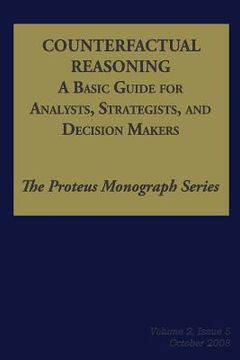Share
Counterfactual Reasoning: A Basic Guide for Analysts, Strategists, and Decision Makers: The Proteus Monograph Series - Volume 2, Issue 5
Ph. D. Noel Hendrickson
(Author)
·
Createspace Independent Publishing Platform
· Paperback
Counterfactual Reasoning: A Basic Guide for Analysts, Strategists, and Decision Makers: The Proteus Monograph Series - Volume 2, Issue 5 - Hendrickson, Ph. D. Noel
Choose the list to add your product or create one New List
✓ Product added successfully to the Wishlist.
Go to My Wishlists
Origin: U.S.A.
(Import costs included in the price)
It will be shipped from our warehouse between
Friday, June 07 and
Tuesday, June 25.
You will receive it anywhere in United Kingdom between 1 and 3 business days after shipment.
Synopsis "Counterfactual Reasoning: A Basic Guide for Analysts, Strategists, and Decision Makers: The Proteus Monograph Series - Volume 2, Issue 5"
Counterfactual reasoning is the process of evaluating conditional claims about alternate possibilities and their consequences (i.e., "What If " statements). These alternatives can be either past possibilities (e.g., "If the United States had not abolished the Iraqi army in 2003, then the Iraqi insurgency would have been significantly smaller in 2005") or future possibilities (e.g., "If Iran had nuclear weapons, then it would provide this technology to Hezbollah"). Counterfactuals are essential to intelligence analysis because they are implicit in all strategic assessments. For, any proposal about the appropriate response to a particular situation (past or future) assumes that certain things would or might occur if that response were made. However, at present, there is no comprehensive system of counterfactual reasoning to establish if these underlying assumptions are plausible. Such a system would have immense potential for analytic transformation as it could unite (or replace) a series of extant techniques of assessing alternate possibilities, such as "What If " Analysis, "High Impact/Low Probability" Analysis, and "Alternate Futures/Scenario" Analysis. And, ultimately, counterfactual reasoning represents the most ideal way to analyze possibilities, for it considers what would or might happen if the possibility were to occur, rather than attempting to determine if the possibility itself is probable. The process of counterfactual reasoning has three stages. The first two of these are somewhat counterintuitive and are easily ignored by analysts. But, they are essential to structuring one's counterfactual reasoning properly. First, one must establish the particular way in which the alternate possibility comes to be (i.e., develop its "back-story"). Second, one must evaluate the events that occur between the time of the alternate possibility and the time for which one is considering its consequences. And third, one must examine the possible consequences of the alternate possibility's back-story and the events that follow it. In doing so, an analyst must connect their conclusion to the specific type of strategic assessment the counterfactual will be used to support: decision making under risk or decision making under uncertainty.

